大学体验英语(第三版)一周一练第四册英语听力文本翻译
- 格式:doc
- 大小:88.00 KB
- 文档页数:23
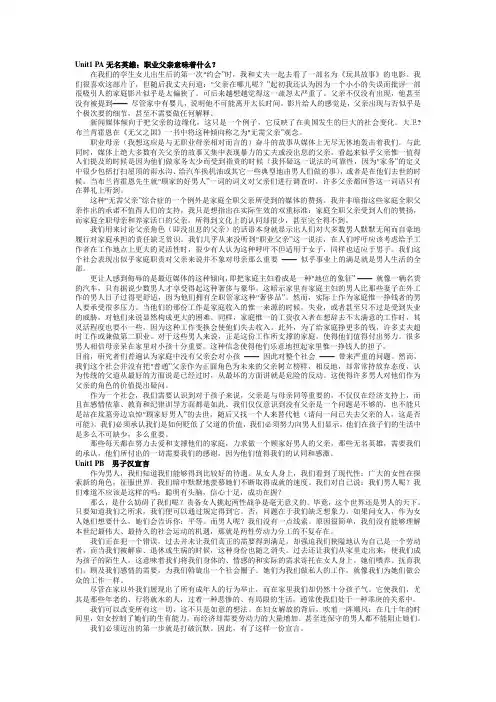
Unit1 PA无名英雄:职业父亲意味着什么?在我们的孪生女儿出生后的第一次"约会”时,我和丈夫一起去看了一部名为《玩具故事》的电影。
我们很喜欢这部片子,但随后我丈夫问道:"父亲在哪儿呢?”起初我还认为因为一个小小的失误而批评一部很吸引人的家庭影片似乎是太偏狭了。
可后来越想越觉得这一疏忽太严重了。
父亲不仅没有出现,他甚至没有被提到——尽管家中有婴儿,说明他不可能离开太长时间。
影片给人的感觉是,父亲出现与否似乎是个极次要的细节,甚至不需要做任何解释。
新闻媒体倾向于把父亲的边缘化,这只是一个例子,它反映了在美国发生的巨大的社会变化。
大卫?布兰肯霍恩在《无父之国》一书中将这种倾向称之为"无需父亲”观念。
职业母亲(我想这应是与无职业母亲相对而言的)奋斗的故事从媒体上无尽无休地轰击着我们。
与此同时,媒体上绝大多数有关父亲的故事又集中表现暴力的丈夫或没出息的父亲。
看起来似乎父亲惟一值得人们提及的时候是因为他们做家务太少而受到指责的时候(我怀疑这一说法的可靠性,因为"家务”的定义中很少包括打扫屋顶的雨水沟、给汽车换机油或其它一些典型地由男人们做的事),或者是在他们去世的时候。
当布兰肯霍恩先生就"顾家的好男人”一词的词义对父亲们进行调查时,许多父亲都回答这一词语只有在葬礼上听到。
这种"无需父亲”综合症的一个例外是家庭全职父亲所受到的媒体的赞扬。
我并非暗指这些家庭全职父亲作出的承诺不值得人们的支持,我只是想指出在实际生效的双重标准:家庭全职父亲受到人们的赞扬,而家庭全职母亲和养家活口的父亲,所得到文化上的认同却很少,甚至完全得不到。
我们用来讨论父亲角色(即没出息的父亲)的话语本身就显示出人们对大多数男人默默无闻而自豪地履行对家庭承担的责任缺乏赏识。
我们几乎从来没听到"职业父亲”这一说法,在人们呼吁应该考虑给予工作者在工作地点上更大的灵活性时,很少有人认为这种呼吁不但适用于女子,同样也适应于男子。
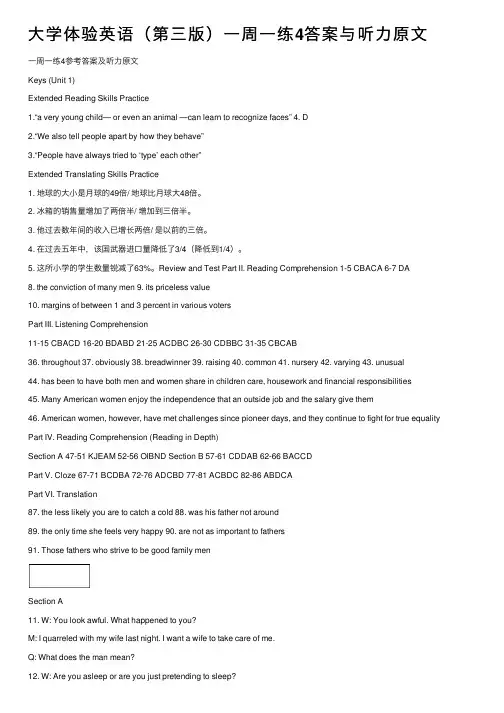
⼤学体验英语(第三版)⼀周⼀练4答案与听⼒原⽂⼀周⼀练4参考答案及听⼒原⽂Keys (Unit 1)Extended Reading Skills Practice1.“a very young child— or even an animal —can learn to recognize faces” 4. D2.“We also tell people apart by how they behave”3.“People have always tried to ‘type’ each other”Extended Translating Skills Practice1. 地球的⼤⼩是⽉球的49倍/ 地球⽐⽉球⼤48倍。
2. 冰箱的销售量增加了两倍半/ 增加到三倍半。
3. 他过去数年间的收⼊已增长两倍/ 是以前的三倍。
4. 在过去五年中,该国武器进⼝量降低了3/4(降低到1/4)。
5. 这所⼩学的学⽣数量锐减了63%。
Review and Test Part II. Reading Comprehension 1-5 CBACA 6-7 DA8. the conviction of many men 9. its priceless value10. margins of between 1 and 3 percent in various votersPart III. Listening Comprehension11-15 CBACD 16-20 BDABD 21-25 ACDBC 26-30 CDBBC 31-35 CBCAB36. throughout 37. obviously 38. breadwinner 39. raising 40. common 41. nursery 42. varying 43. unusual44. has been to have both men and women share in children care, housework and financial responsibilities45. Many American women enjoy the independence that an outside job and the salary give them46. American women, however, have met challenges since pioneer days, and they continue to fight for true equality Part IV. Reading Comprehension (Reading in Depth)Section A 47-51 KJEAM 52-56 OIBND Section B 57-61 CDDAB 62-66 BACCDPart V. Cloze 67-71 BCDBA 72-76 ADCBD 77-81 ACBDC 82-86 ABDCAPart VI. Translation87. the less likely you are to catch a cold 88. was his father not around89. the only time she feels very happy 90. are not as important to fathers91. Those fathers who strive to be good family menSection A11. W: You look awful. What happened to you?M: I quarreled with my wife last night. I want a wife to take care of me.Q: What does the man mean?12. W: Are you asleep or are you just pretending to sleep?M: I’m really asleep.W: If you can hear me, you must be faking it. Good, you can give me a hand with the chores.Q: What is the probable relationship between the man and the woman?13. M: Mary doesn’t want me to take the job. She says our child is too young and thejob requires much travelling.W: You should talk to her again and see if you can find a way out. Think about the gains and losses before you make a decision.Q: What do we learn from the conversation?14. M: Cathy and Bill got a separation.W: It’s really a shame. I’ve heard that they quarrel, but they’ve always made up afterwards.Q: What probably happened to Cathy and Bill?15. M: What kind of father am I? My only son almost died, and I did n’t even know hewas ill.W: Don’t blame yourself. You were too busy to pay attention to him. If his mother was still alive, things would have been much better.Q: Why does the man blame himself?16. M: You had a job interview yesterday, didn’t you? How did it go?W: Not too bad, I guess. There were about 20 candidates competing for the sales manager’s job. And finally it was down to three of us, but, unfortunately, the other two are men. And they seemed better qualified.Q: What does the woman imply?17. W: It is so hard for the female graduates to find a suitable job these days.M: Yeah, it is also the case to the male graduates.Q: What does the man mean?18. M: Congratulations! Vicky! You have been offered the chance to study abroad forhalf a year.W: Thanks, Jack! But it’s hard for me to make the decision. I really don’t know how to strike a balance between being a mother and a teacher.Q: Why is the woman not so happy?Conversation oneMother: Hello, Frank, this is Mum. Have you made any plans for your work after graduation?Frank: Well, Mum, I’d prefer a job at a large hospital in Beijing or shanghai.Mother: As a doctor?Frank: No, not exactly a doctor. I’d rather work as a nursing officer. It’s em… it’s what a lot of people call a male nurse. Mother: A male nurse? Are you kidding, Frank?Frank: No, I’m serious, Mum. I know, people usually think nurses are female and male nurses seem to be strange and they are assumed to be failed doctors but…Mother: Frank, I thought you really wanted to be a doctor?Frank: No, Can you believe that I really want to be a nurse and that er…er… it isn’t just that I may fail as a doctor? Mother: Frank, my dear, don’t you realize that nurses do different things from doctors?Frank: I know very well, Mum. As a male nurse you have much more contact with the er… patients and you know, a long term responsibility for their …their welfare.Huh, there’s no way I’d want to be a doctor…they have practically no personal contact with their patients…Mother: Dear, you should know people usually think nursing is female’s work. It’s not suitable for a male, because it require care and patience.Frank: Mum, that’s a stereotypical view of nursing. The world has changed, and so has people’s attitudes towards job roles. I’m really interested in this job and have qualifications for it, why shouldn’t I do it? Believe me, Mum, I’m going to be a really good nurse.Questions 19 to 22 are based on the conversation you have just heard.19. What is people’s usual view on male nurses?20. According to Frank, what is the difference between doctors and nurses?21. Why does Frank’ mother think this job is not suitable for a male?22. For what reason does Frank choose to work as a nurse?Conversation twoJane: Mike, is it possible for you to spare some time this weekend to take John to the zoo?Mike: I’m sorry, Jane. I wish I could. But…Jane: Please, Mike, don’t tell me you are busy again this weekend. You are always busy with your work, ever-ending work. Why don’t you think about your son and me?Mike: I do. You should know, Jane, what I’m working for. I’m trying my best to earn more money to support the family. Jane, you know, it’s getting difficult to make ends meet.Jane: Yes, you are doing your best. And I know you are a very successful manager.But Mike, you have to admit you are not a devoted father.Mike: That’s unfair, Jane. It really hurt me when you say that.Jane: It seems to me that all you really care about is your career; you don’t show enough concern for my work or the education of our sonMike: What do you mean, Jane? I do care about you and our son. But the problem is I…I just don’t have time to take care of the family. I feel really terrible. Jane: Mike, what I mean… I mean you should try to understand me, understand how hard it is as a working mother. I have to strive to keep the balance betweenbeing a mother and a professional. You know it’s really hard. Keeping up the family responsibilities at home, and still having to work hard at my job. You should know there is always the possibility of being laid off.Mike: Don’t worry so much, Jane. To be honest, I’d rather you stay at home to bea full-time housewife, so…Jane: No, no way. I wouldn’t give up my career for anything.Mike: All right, all right, let’s talk about it later.Questions 23 to 25 are based on the conversation you have just heard.23. According to Mike, why is he working so hard?24. Which of the following statements is not true about Jane as a working mother?25. What does Mike suggest Jane to do to relieve her hardness as a working mother?Section BPassage OneMore often than not, household chores will lead to tired and angry couples. It’s known to all that housework often triggers disputes in a marriage. Surrounded by piles of laundry, dirty plates, both husbands and wives feel stressed. But here the wives voice is louder, especially for those with kids. According to a survey, each child brings an increase of more than thirty hours of housework per week. The accumulating cleaning, shopping, and cooking just drive the wife crazy.In an idealistic case, the husband will help out. Yet most bread-earners habitually turn a blind eye. When wives bury them in dishes and anticipate emotional response, husbands are changing channels for action movies. Moreover, when being warned。
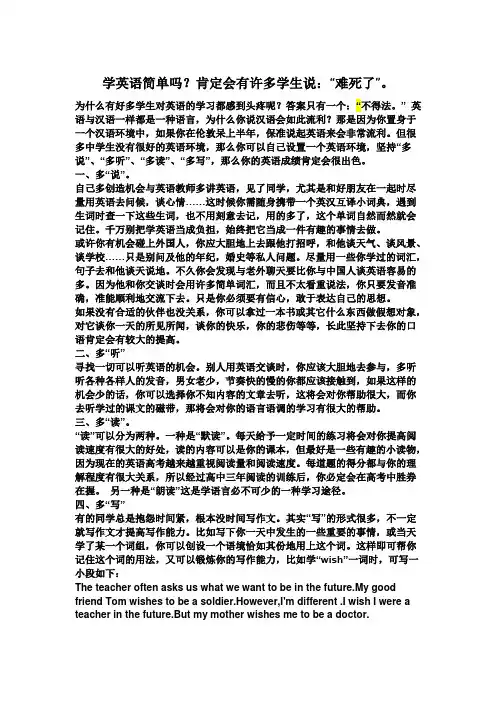
学英语简单吗?肯定会有许多学生说:“难死了”。
为什么有好多学生对英语的学习都感到头疼呢?答案只有一个:“不得法。
” 英语与汉语一样都是一种语言,为什么你说汉语会如此流利?那是因为你置身于一个汉语环境中,如果你在伦敦呆上半年,保准说起英语来会非常流利。
但很多中学生没有很好的英语环境,那么你可以自己设置一个英语环境,坚持“多说”、“多听”、“多读”、“多写”,那么你的英语成绩肯定会很出色。
一、多“说”。
自己多创造机会与英语教师多讲英语,见了同学,尤其是和好朋友在一起时尽量用英语去问候,谈心情……这时候你需随身携带一个英汉互译小词典,遇到生词时查一下这些生词,也不用刻意去记,用的多了,这个单词自然而然就会记住。
千万别把学英语当成负担,始终把它当成一件有趣的事情去做。
或许你有机会碰上外国人,你应大胆地上去跟他打招呼,和他谈天气、谈风景、谈学校……只是别问及他的年纪,婚史等私人问题。
尽量用一些你学过的词汇,句子去和他谈天说地。
不久你会发现与老外聊天要比你与中国人谈英语容易的多。
因为他和你交谈时会用许多简单词汇,而且不太看重说法,你只要发音准确,准能顺利地交流下去。
只是你必须要有信心,敢于表达自己的思想。
如果没有合适的伙伴也没关系,你可以拿过一本书或其它什么东西做假想对象,对它谈你一天的所见所闻,谈你的快乐,你的悲伤等等,长此坚持下去你的口语肯定会有较大的提高。
二、多“听”寻找一切可以听英语的机会。
别人用英语交谈时,你应该大胆地去参与,多听听各种各样人的发音,男女老少,节奏快的慢的你都应该接触到,如果这样的机会少的话,你可以选择你不知内容的文章去听,这将会对你帮助很大,而你去听学过的课文的磁带,那将会对你的语言语调的学习有很大的帮助。
三、多“读”。
“读”可以分为两种。
一种是“默读”。
每天给予一定时间的练习将会对你提高阅读速度有很大的好处,读的内容可以是你的课本,但最好是一些有趣的小读物,因为现在的英语高考越来越重视阅读量和阅读速度。
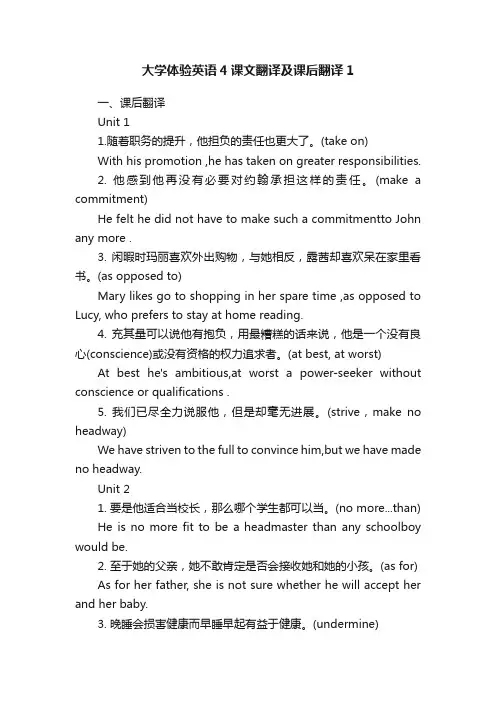
大学体验英语4课文翻译及课后翻译1一、课后翻译Unit 11.随着职务的提升,他担负的责任也更大了。
(take on)With his promotion ,he has taken on greater responsibilities.2. 他感到他再没有必要对约翰承担这样的责任。
(make a commitment)He felt he did not have to make such a commitmentto John any more .3. 闲暇时玛丽喜欢外出购物,与她相反,露茜却喜欢呆在家里看书。
(as opposed to)Mary likes go to shopping in her spare time ,as opposed to Lucy, who prefers to stay at home reading.4. 充其量可以说他有抱负,用最糟糕的话来说,他是一个没有良心(conscience)或没有资格的权力追求者。
(at best, at worst) At best he's ambitious,at worst a power-seeker without conscience or qualifications .5. 我们已尽全力说服他,但是却毫无进展。
(strive,make no headway)We have striven to the full to convince him,but we have made no headway.Unit 21. 要是他适合当校长,那么哪个学生都可以当。
(no more...than)He is no more fit to be a headmaster than any schoolboy would be.2. 至于她的父亲,她不敢肯定是否会接收她和她的小孩。
(as for)As for her father, she is not sure whether he will accept her and her baby.3. 晚睡会损害健康而早睡早起有益于健康。
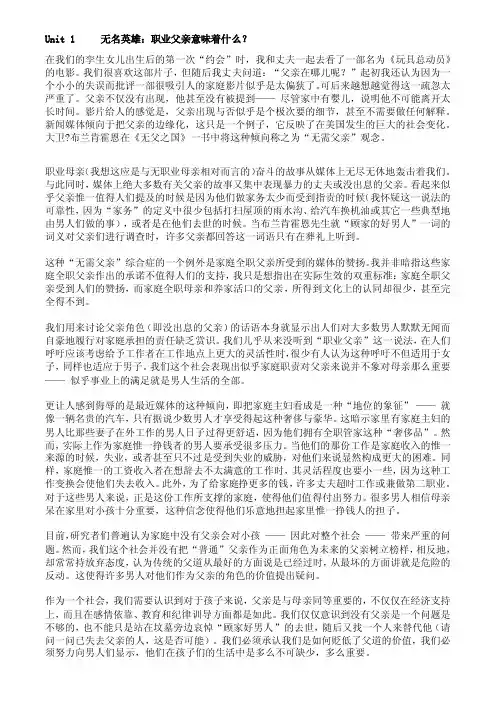
Unit 1 无名英雄:职业父亲意味着什么?在我们的孪生女儿出生后的第一次“约会”时,我和丈夫一起去看了一部名为《玩具总动员》的电影。
我们很喜欢这部片子,但随后我丈夫问道:“父亲在哪儿呢?”起初我还认为因为一个小小的失误而批评一部很吸引人的家庭影片似乎是太偏狭了。
可后来越想越觉得这一疏忽太严重了。
父亲不仅没有出现,他甚至没有被提到——尽管家中有婴儿,说明他不可能离开太长时间。
影片给人的感觉是,父亲出现与否似乎是个极次要的细节,甚至不需要做任何解释。
新闻媒体倾向于把父亲的边缘化,这只是一个例子,它反映了在美国发生的巨大的社会变化。
大卫?布兰肯霍恩在《无父之国》一书中将这种倾向称之为“无需父亲”观念。
职业母亲(我想这应是与无职业母亲相对而言的)奋斗的故事从媒体上无尽无休地轰击着我们。
与此同时,媒体上绝大多数有关父亲的故事又集中表现暴力的丈夫或没出息的父亲。
看起来似乎父亲惟一值得人们提及的时候是因为他们做家务太少而受到指责的时候(我怀疑这一说法的可靠性,因为“家务”的定义中很少包括打扫屋顶的雨水沟、给汽车换机油或其它一些典型地由男人们做的事),或者是在他们去世的时候。
当布兰肯霍恩先生就“顾家的好男人”一词的词义对父亲们进行调查时,许多父亲都回答这一词语只有在葬礼上听到。
这种“无需父亲”综合症的一个例外是家庭全职父亲所受到的媒体的赞扬。
我并非暗指这些家庭全职父亲作出的承诺不值得人们的支持,我只是想指出在实际生效的双重标准:家庭全职父亲受到人们的赞扬,而家庭全职母亲和养家活口的父亲,所得到文化上的认同却很少,甚至完全得不到。
我们用来讨论父亲角色(即没出息的父亲)的话语本身就显示出人们对大多数男人默默无闻而自豪地履行对家庭承担的责任缺乏赏识。
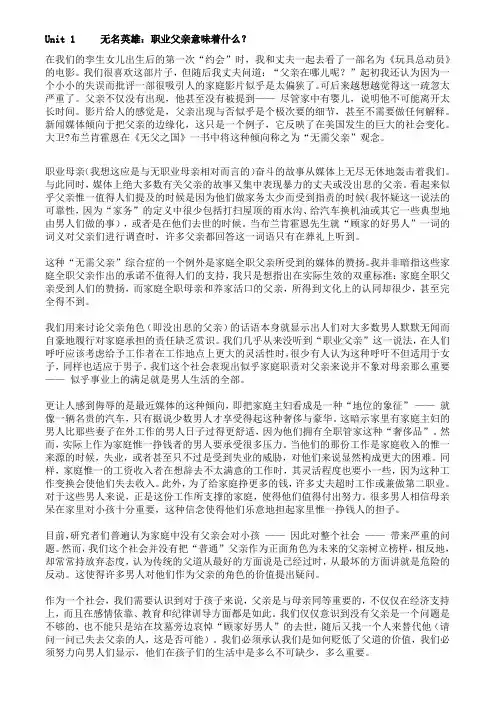
Unit 1 无名英雄:职业父亲意味着什么?在我们的孪生女儿出生后的第一次“约会”时,我和丈夫一起去看了一部名为《玩具总动员》的电影。
我们很喜欢这部片子,但随后我丈夫问道:“父亲在哪儿呢?”起初我还认为因为一个小小的失误而批评一部很吸引人的家庭影片似乎是太偏狭了。
可后来越想越觉得这一疏忽太严重了。
父亲不仅没有出现,他甚至没有被提到——尽管家中有婴儿,说明他不可能离开太长时间。
影片给人的感觉是,父亲出现与否似乎是个极次要的细节,甚至不需要做任何解释。
新闻媒体倾向于把父亲的边缘化,这只是一个例子,它反映了在美国发生的巨大的社会变化。
大卫?布兰肯霍恩在《无父之国》一书中将这种倾向称之为“无需父亲”观念。
职业母亲(我想这应是与无职业母亲相对而言的)奋斗的故事从媒体上无尽无休地轰击着我们。
与此同时,媒体上绝大多数有关父亲的故事又集中表现暴力的丈夫或没出息的父亲。
看起来似乎父亲惟一值得人们提及的时候是因为他们做家务太少而受到指责的时候(我怀疑这一说法的可靠性,因为“家务”的定义中很少包括打扫屋顶的雨水沟、给汽车换机油或其它一些典型地由男人们做的事),或者是在他们去世的时候。
当布兰肯霍恩先生就“顾家的好男人”一词的词义对父亲们进行调查时,许多父亲都回答这一词语只有在葬礼上听到。
这种“无需父亲”综合症的一个例外是家庭全职父亲所受到的媒体的赞扬。
我并非暗指这些家庭全职父亲作出的承诺不值得人们的支持,我只是想指出在实际生效的双重标准:家庭全职父亲受到人们的赞扬,而家庭全职母亲和养家活口的父亲,所得到文化上的认同却很少,甚至完全得不到。
我们用来讨论父亲角色(即没出息的父亲)的话语本身就显示出人们对大多数男人默默无闻而自豪地履行对家庭承担的责任缺乏赏识。
我们几乎从来没听到“职业父亲”这一说法,在人们呼吁应该考虑给予工作者在工作地点上更大的灵活性时,很少有人认为这种呼吁不但适用于女子,同样也适应于男子。
我们这个社会表现出似乎家庭职责对父亲来说并不象对母亲那么重要——似乎事业上的满足就是男人生活的全部。
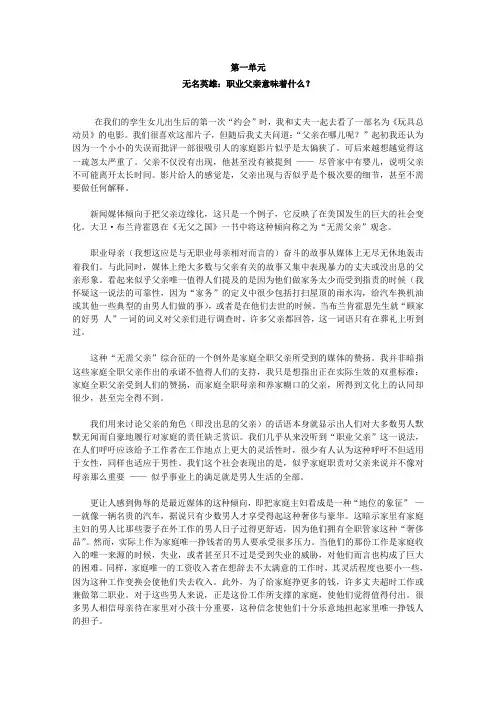
第一单元无名英雄:职业父亲意味着什么?在我们的孪生女儿出生后的第一次“约会”时,我和丈夫一起去看了一部名为《玩具总动员》的电影。
我们很喜欢这部片子,但随后我丈夫问道:“父亲在哪儿呢?”起初我还认为因为一个小小的失误而批评一部很吸引人的家庭影片似乎是太偏狭了。
可后来越想越觉得这一疏忽太严重了。
父亲不仅没有出现,他甚至没有被提到——尽管家中有婴儿,说明父亲不可能离开太长时间。
影片给人的感觉是,父亲出现与否似乎是个极次要的细节,甚至不需要做任何解释。
新闻媒体倾向于把父亲边缘化,这只是一个例子,它反映了在美国发生的巨大的社会变化。
大卫·布兰肯霍恩在《无父之国》一书中将这种倾向称之为“无需父亲”观念。
职业母亲(我想这应是与无职业母亲相对而言的)奋斗的故事从媒体上无尽无休地轰击着我们。
与此同时,媒体上绝大多数与父亲有关的故事又集中表现暴力的丈夫或没出息的父亲形象。
看起来似乎父亲唯一值得人们提及的是因为他们做家务太少而受到指责的时候(我怀疑这一说法的可靠性,因为“家务”的定义中很少包括打扫屋顶的雨水沟,给汽车换机油或其他一些典型的由男人们做的事),或者是在他们去世的时候。
当布兰肯霍恩先生就“顾家的好男人”一词的词义对父亲们进行调查时,许多父亲都回答,这一词语只有在葬礼上听到过。
这种“无需父亲”综合征的一个例外是家庭全职父亲所受到的媒体的赞扬。
我并非暗指这些家庭全职父亲作出的承诺不值得人们的支持,我只是想指出正在实际生效的双重标准:家庭全职父亲受到人们的赞扬,而家庭全职母亲和养家糊口的父亲,所得到文化上的认同却很少,甚至完全得不到。
我们用来讨论父亲的角色(即没出息的父亲)的话语本身就显示出人们对大多数男人默默无闻而自豪地履行对家庭的责任缺乏赏识。
我们几乎从来没听到“职业父亲”这一说法,在人们呼吁应该给予工作者在工作地点上更大的灵活性时,很少有人认为这种呼吁不但适用于女性,同样也适应于男性。
我们这个社会表现出的是,似乎家庭职责对父亲来说并不像对母亲那么重要——似乎事业上的满足就是男人生活的全部。
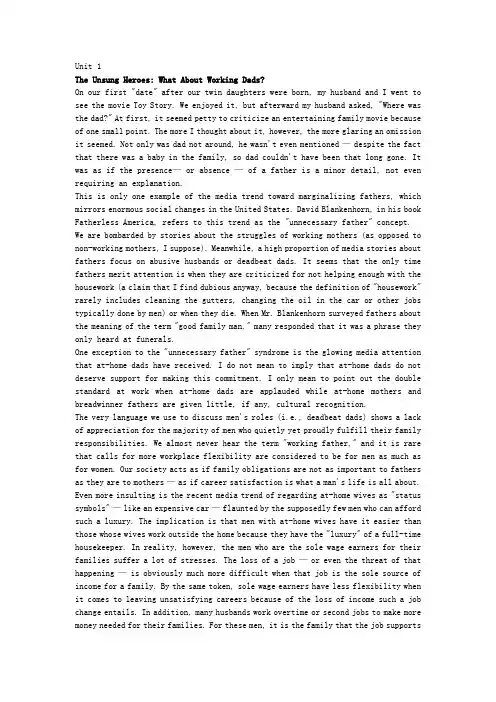
Unit 1The Unsung Heroes: What About Working Dads?On our first "date" after our twin daughters were born, my husband and I went to see the movie Toy Story. We enjoyed it, but afterward my husband asked, "Where was the dad?" At first, it seemed petty to criticize an entertaining family movie because of one small point. The more I thought about it, however, the more glaring an omission it seemed. Not only was dad not around, he wasn't even mentioned —despite the fact that there was a baby in the family, so dad couldn't have been that long gone. It was as if the presence— or absence — of a father is a minor detail, not even requiring an explanation.This is only one example of the media trend toward marginalizing fathers, which mirrors enormous social changes in the United States. David Blankenhorn, in his book Fatherless America, refers to this trend as the "unnecessary father" concept. We are bombarded by stories about the struggles of working mothers (as opposed to non-working mothers, I suppose). Meanwhile, a high proportion of media stories about fathers focus on abusive husbands or deadbeat dads. It seems that the only time fathers merit attention is when they are criticized for not helping enough with the housework (a claim that I find dubious anyway, because the definition of "housework" rarely includes cleaning the gutters, changing the oil in the car or other jobs typically done by men) or when they die. When Mr. Blankenhorn surveyed fathers about the meaning of the term "good family man," many responded that it was a phrase they only heard at funerals.One exception to the "unnecessary father" syndrome is the glowing media attention that at-home dads have received. I do not mean to imply that at-home dads do not deserve support for making this commitment. I only mean to point out the double standard at work when at-home dads are applauded while at-home mothers and breadwinner fathers are given little, if any, cultural recognition.The very language we use to discuss men's roles (i.e., deadbeat dads) shows a lack of appreciation for the majority of men who quietly yet proudly fulfill their family responsibilities. We almost never hear the term "working father," and it is rare that calls for more workplace flexibility are considered to be for men as much as for women. Our society acts as if family obligations are not as important to fathers as they are to mothers —as if career satisfaction is what a man's life is all about. Even more insulting is the recent media trend of regarding at-home wives as "status symbols" —like an expensive car —flaunted by the supposedly few men who can afford such a luxury. The implication is that men with at-home wives have it easier than those whose wives work outside the home because they have the "luxury" of a full-time housekeeper. In reality, however, the men who are the sole wage earners for their families suffer a lot of stresses. The loss of a job — or even the threat of that happening — is obviously much more difficult when that job is the sole source of income for a family. By the same token, sole wage earners have less flexibility when it comes to leaving unsatisfying careers because of the loss of income such a job change entails. In addition, many husbands work overtime or second jobs to make more money needed for their families. For these men, it is the family that the job supportsthat makes it all worthwhile. It is the belief that having a mother at home is important to the children, which makes so many men gladly take on the burden of being a sole wage earner.Today, there is widespread agreement among researchers that the absence of fathers from households causes serious problems for children and, consequently, for society at large. Yet, rather than holding up "ordinary" fathers as positive role models for the dads of tomorrow, too often society has thrown up its hands and decided that traditional fatherhood is at best obsolete and at worst dangerously reactionary. This has left many men questioning the value of their role as fathers.As a society, we need to realize that fathers are just as important to children as mothers are —not only for financial support, but for emotional support, education and discipline as well. It is not enough for us merely to recognize that fatherlessness is a problem — to stand beside the grave and mourn the loss of the "good family man" and then try to find someone to replace him (ask anyone who has lost a father to death if that is possible). We must acknowledge how we have devalued fatherhood and work to show men how necessary, how important they are in their children's lives.Those fathers who strive to be good family men by being there every day to love and support their families —those unsung heroes —need our recognition and our thanks for all they do. Because they deserve it无名英雄:职业父亲意味着什么?在我们的孪生女儿出生后的第一次"约会”时,我和丈夫一起去看了一部名为《玩具故事》的电影。
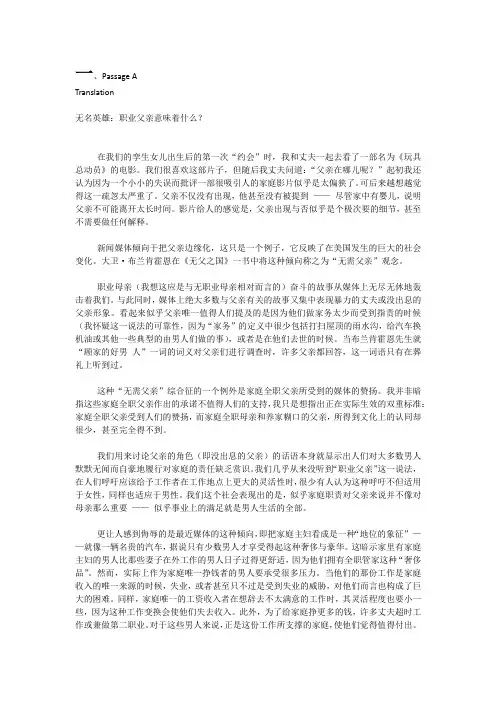
一、Passage ATranslation无名英雄:职业父亲意味着什么?在我们的孪生女儿出生后的第一次“约会”时,我和丈夫一起去看了一部名为《玩具总动员》的电影。
我们很喜欢这部片子,但随后我丈夫问道:“父亲在哪儿呢?”起初我还认为因为一个小小的失误而批评一部很吸引人的家庭影片似乎是太偏狭了。
可后来越想越觉得这一疏忽太严重了。
父亲不仅没有出现,他甚至没有被提到——尽管家中有婴儿,说明父亲不可能离开太长时间。
影片给人的感觉是,父亲出现与否似乎是个极次要的细节,甚至不需要做任何解释。
新闻媒体倾向于把父亲边缘化,这只是一个例子,它反映了在美国发生的巨大的社会变化。
大卫·布兰肯霍恩在《无父之国》一书中将这种倾向称之为“无需父亲”观念。
职业母亲(我想这应是与无职业母亲相对而言的)奋斗的故事从媒体上无尽无休地轰击着我们。
与此同时,媒体上绝大多数与父亲有关的故事又集中表现暴力的丈夫或没出息的父亲形象。
看起来似乎父亲唯一值得人们提及的是因为他们做家务太少而受到指责的时候(我怀疑这一说法的可靠性,因为“家务”的定义中很少包括打扫屋顶的雨水沟,给汽车换机油或其他一些典型的由男人们做的事),或者是在他们去世的时候。
当布兰肯霍恩先生就“顾家的好男人”一词的词义对父亲们进行调查时,许多父亲都回答,这一词语只有在葬礼上听到过。
这种“无需父亲”综合征的一个例外是家庭全职父亲所受到的媒体的赞扬。
我并非暗指这些家庭全职父亲作出的承诺不值得人们的支持,我只是想指出正在实际生效的双重标准:家庭全职父亲受到人们的赞扬,而家庭全职母亲和养家糊口的父亲,所得到文化上的认同却很少,甚至完全得不到。
我们用来讨论父亲的角色(即没出息的父亲)的话语本身就显示出人们对大多数男人默默无闻而自豪地履行对家庭的责任缺乏赏识。
我们几乎从来没听到“职业父亲”这一说法,在人们呼吁应该给予工作者在工作地点上更大的灵活性时,很少有人认为这种呼吁不但适用于女性,同样也适应于男性。
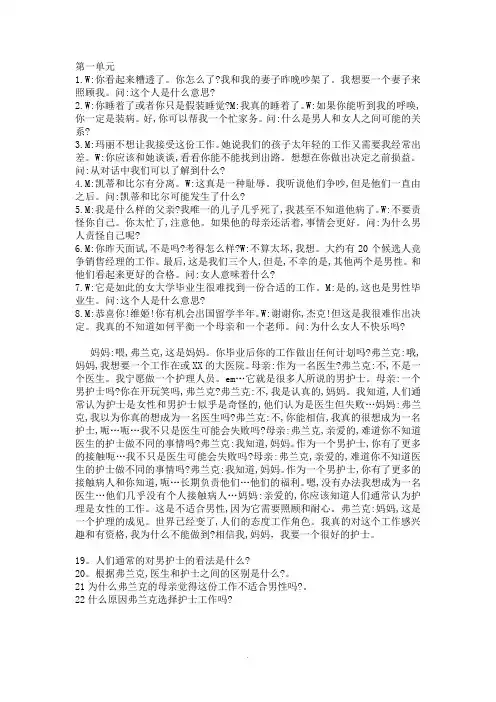
第一单元1.W:你看起来糟透了。
你怎么了?我和我的妻子昨晚吵架了。
我想要一个妻子来照顾我。
问:这个人是什么意思?2.W:你睡着了或者你只是假装睡觉?M:我真的睡着了。
W:如果你能听到我的呼唤,你一定是装病。
好,你可以帮我一个忙家务。
问:什么是男人和女人之间可能的关系?3.M:玛丽不想让我接受这份工作。
她说我们的孩子太年轻的工作又需要我经常出差。
W:你应该和她谈谈,看看你能不能找到出路。
想想在你做出决定之前损益。
问:从对话中我们可以了解到什么?4.M:凯蒂和比尔有分离。
W:这真是一种耻辱。
我听说他们争吵,但是他们一直由之后。
问:凯蒂和比尔可能发生了什么?5.M:我是什么样的父亲?我唯一的儿子几乎死了,我甚至不知道他病了。
W:不要责怪你自己。
你太忙了,注意他。
如果他的母亲还活着,事情会更好。
问:为什么男人责怪自己呢?6.M:你昨天面试,不是吗?考得怎么样?W:不算太坏,我想。
大约有20个候选人竞争销售经理的工作。
最后,这是我们三个人,但是,不幸的是,其他两个是男性。
和他们看起来更好的合格。
问:女人意味着什么?7.W:它是如此的女大学毕业生很难找到一份合适的工作。
M:是的,这也是男性毕业生。
问:这个人是什么意思?8.M:恭喜你!维姬!你有机会出国留学半年。
W:谢谢你,杰克!但这是我很难作出决定。
我真的不知道如何平衡一个母亲和一个老师。
问:为什么女人不快乐吗?妈妈:喂,弗兰克,这是妈妈。
你毕业后你的工作做出任何计划吗?弗兰克:哦,妈妈,我想要一个工作在或XX的大医院。
母亲:作为一名医生?弗兰克:不,不是一个医生。
我宁愿做一个护理人员。
em…它就是很多人所说的男护士。
母亲:一个男护士吗?你在开玩笑吗,弗兰克?弗兰克:不,我是认真的,妈妈。
我知道,人们通常认为护士是女性和男护士似乎是奇怪的,他们认为是医生但失败…妈妈:弗兰克,我以为你真的想成为一名医生吗?弗兰克:不,你能相信,我真的很想成为一名护士,呃…呃…我不只是医生可能会失败吗?母亲:弗兰克,亲爱的,难道你不知道医生的护士做不同的事情吗?弗兰克:我知道,妈妈。

Frog Story 蛙的故事A couple of odd things have happened lately. 最近发生了几桩怪事儿.I have a log cabin in those woods of Northern Wisconsin. I built it by hand and also added a greenh ouse to the front of it. It is a joy to live in。
In fact, I work out of my home doing audio production an d environmental work。
As a tool of that trade I have a computer and a studio。
我在北威斯康星州的树林中有一座小木屋.是我亲手搭建的,前面还有一间花房.住在里面相当惬意。
实际上我是在户外做音频制作和环境方面的工作——作为干这一行的工具,我还装备了一间带电脑的工作室。
I also have a tree frog that has taken up residence in my studio. 还有一只树蛙也在我的工作室中住了下来。
How odd, I thought, last November when I first noticed him sitting atop my sound—board over my computer.I figured that he(and I say he,though I really don't have a clue if she is a he or vice versa) would be more comfortable in the green house。
So I put him in the greenhouse. Back he came. And stayed。
Unit 1The Unsung Heroes: What About Working Dads?On our first "date" after our twin daughters were born, my husband and I went to see the movie Toy Story. We enjoyed it, but afterward my husband asked, "Where was the dad?" At first, it seemed petty to criticize an entertaining family movie because of one small point. The more I thought about it, however, the more glaring an omission it seemed. Not only was dad not around, he wasn't even mentioned —despite the fact that there was a baby in the family, so dad couldn't have been that long gone. It was as if the presence— or absence — of a father is a minor detail, not even requiring an explanation.This is only one example of the media trend toward marginalizing fathers, which mirrors enormous social changes in the United States. David Blankenhorn, in his book Fatherless America, refers to this trend as the "unnecessary father" concept. We are bombarded by stories about the struggles of working mothers (as opposed to non-working mothers, I suppose). Meanwhile, a high proportion of media stories about fathers focus on abusive husbands or deadbeat dads. It seems that the only time fathers merit attention is when they are criticized for not helping enough with the housework (a claim that I find dubious anyway, because the definition of "housework" rarely includes cleaning the gutters, changing the oil in the car or other jobs typically done by men) or when they die. When Mr. Blankenhorn surveyed fathers about the meaning of the term "good family man," many responded that it was a phrase they only heard at funerals.One exception to the "unnecessary father" syndrome is the glowing media attention that at-home dads have received. I do not mean to imply that at-home dads do not deserve support for making this commitment. I only mean to point out the double standard at work when at-home dads are applauded while at-home mothers and breadwinner fathers are given little, if any, cultural recognition.The very language we use to discuss men's roles (i.e., deadbeat dads) shows a lack of appreciation for the majority of men who quietly yet proudly fulfill their family responsibilities. We almost never hear the term "working father," and it is rare that calls for more workplace flexibility are considered to be for men as much as for women. Our society acts as if family obligations are not as important to fathers as they are to mothers —as if career satisfaction is what a man's life is all about. Even more insulting is the recent media trend of regarding at-home wives as "status symbols" —like an expensive car —flaunted by the supposedly few men who can afford such a luxury. The implication is that men with at-home wives have it easier than those whose wives work outside the home because they have the "luxury" of a full-time housekeeper. In reality, however, the men who are the sole wage earners for their families suffer a lot of stresses. The loss of a job — or even the threat of that happening — is obviously much more difficult when that job is the sole source of income for a family. By the same token, sole wage earners have less flexibility when it comes to leaving unsatisfying careers because of the loss of income such a job change entails. In addition, many husbands work overtime or second jobs to make more money needed for their families. For these men, it is the family that the job supportsthat makes it all worthwhile. It is the belief that having a mother at home is important to the children, which makes so many men gladly take on the burden of being a sole wage earner.Today, there is widespread agreement among researchers that the absence of fathers from households causes serious problems for children and, consequently, for society at large. Yet, rather than holding up "ordinary" fathers as positive role models for the dads of tomorrow, too often society has thrown up its hands and decided that traditional fatherhood is at best obsolete and at worst dangerously reactionary. This has left many men questioning the value of their role as fathers.As a society, we need to realize that fathers are just as important to children as mothers are —not only for financial support, but for emotional support, education and discipline as well. It is not enough for us merely to recognize that fatherlessness is a problem — to stand beside the grave and mourn the loss of the "good family man" and then try to find someone to replace him (ask anyone who has lost a father to death if that is possible). We must acknowledge how we have devalued fatherhood and work to show men how necessary, how important they are in their children's lives.Those fathers who strive to be good family men by being there every day to love and support their families —those unsung heroes —need our recognition and our thanks for all they do. Because they deserve it无名英雄:职业父亲意味着什么?在我们的孪生女儿出生后的第一次"约会”时,我和丈夫一起去看了一部名为《玩具故事》的电影。
Listening Scripts (4)Part III. Listening ComprehensionSection A:Directions: In this section, you will hear 8 short conversations and 2 long conversations.. At the end of each conversation, one or more questions will be asked about what was said. Both the conversations and the questions will be spoken only once. After each question there will be a pause. During the pause, you must read the four choices marked A), B), C) and D), and decide which is the best answer. Then write the corresponding letter on Answer Sheet 2.11. M: Would you like a copy of Professor Smith’s article?W: Thanks, if it’s not too much trouble.Q: What does the woman imply?12. W: Did you visit the Television Tower when you had your vacation in Shanghailast summer?M: I c ouldn’t make it last June. But I finally visited it two months later. I plan to visit it again sometime next year.Q: What do we learn about the man?13. M: Prof. Kennedy has been very busy this semester. As far as I know, he worksuntil mid-night every day.W: I wouldn’t have troubled him so much if I had known he was so busy.Q: What do we learn from the conversation?14. W: If I were you, I would have accepted the job.M: I turned down the offer because it would mean frequent business trips away from my family:Q: Why didn’t the man accept the job?15. M: How are you gett ing on with your essay, Mary? I’m having a real hard timewith mine.W: After two sleepless nights, I’m finally through with it.Q: What do we learn from this conversation?16. M: Wouldn’t you get bored with the same routine year after year teaching thesame things to children?W: I don’t think it would be as boring as working in an office. Teaching is more stimulating.Q: What does the woman imply about office work?17. W: Oh, it’s so cold. We haven’t had such a severe winter for so long, have we?M: Yes, the forecast says it’s going to get worse before it warms up.Q: What do we learn from the conversation?18. M: You were seen hanging about the store on the night when it was robbed, weren’t you?W: Me? You must have made a mistake. I was at home that night.Q: What are they talking about?Now you will hear two long conversations.Conversation 1M: I understand you’d like to go for further study.W: Yes, Professor Smith. I’d like to very much. Could you tell me where I might get some information about colleges and universities?M: Yes, the Internet should have some catalogs.W: Thank you.M: It’s my pleasure. Of course, you can also write d irectly to any university for its catalogue.W: Could you write a letter of recommendation for me? I am applying for admission to the University of California for postgraduate studies.M: Ah, that’s a good university. Sure, I’d be happy to write you one.W: Thank you very much. When can I pick it up?M: You don’t have to. American universities prefer to have a letter of recommendation sent directly from the people who write them. Just leave me some information about where you want it sent, and I’ll have it in the mail by tomorrow afternoon.Questions 19 to 22 are based on the conversation you have just heard.19.What’s the relationship between the two speakers?20.Where can he get the information about colleges and universities?21.What does the woman ask the man to do?22.When does the man send the letter?Conversation 2W: Hello, this is Dr. Green’s office. May I help you?M: I’d like to make an appointment to see the doctor.W: Well, what’s wrong with you?M: I’ve had severe pains in my throat.W: What time do you think is convenient?M: I really am in pain so I would like an appointment as soon as possible.W: What about tomorrow morning?M: Yes, that would be fine.W: Is 9:30 okay?M: Okay.W: I need some information for your record. Could you please give me your full name, address, phone number and insurance coverage?M: Sure.Questions 23 to 25 are based on the conversation you have just heard.23.What is the probable relationship between the two speakers?24.Where is the man’s pain?25.What is the man going to do?Section B:Directions: In this section, you will hear 3 short passages. At the end of each passage, you will hear some questions. Both the passage and the questions will be spoken only once. After you hear a question, you must choose the best answer from the four choices marked A), B),C),and D). Then write the corresponding letter on the Answer Sheet 2.Passage OneThere are three groups of English learners: beginners, intermediate learners, and learners of special English. Beginners need to learn the basics of English. Students who have reached an intermediate level benefit from learning general English skills. But what about student who want to learn specialist English for their work or professional life? Most students, who fit into this third group have a clear idea about what they want to learn. A bank clerk, for example, wants to use this specialist vocabulary and technical terms of finance. But for teachers, deciding how to teach specialist English is not always so easy. For a start, the variety is enormous. Every field from airline pilots to secretaries has its own vocabulary and technical terms. Teachers also need to have an up-to-date knowledge of that specialist language, and not many teachers are exposed to working environments outside the classroom. These issues have influenced the way specialist English is taught in schools. This type of course is usually known as English for Specific Purposes, or ESP and there aren't ESP courses for almost every area of professional and working life. In Britain, for example,there are courses, which teach English for doctors, lawyers, reporters, travel agents and people working in the hotel industry. By far, the most popular ESP courses are for business English.Questions 26 to 28 are based on the passage you have just heard.26. What is the characteristic of learners of special English?27. Who needs ESP courses most?28. What are the most popular ESP courses in Britain?Passage TwoSports and games are very useful for character-training. In their lessons, boys and girls may learn about such virtues as unselfishness, courage, discipline and love of one’s country. But what is learned in books cannot have the same deep effect on a child as wh at is learned by experience. As most of the pupils’ time is spent in classes studying lessons, the ordinary school can't give much practical training for their lives in the future. So it is what the pupils do in the spare time that really prepares them to take their places in society as citizens when they grow up. If each of them learns to go all out for his team and not for himself on the football field, he will later find it natural to work for the good of his country instead of only for his own benefit.Questions 29 to 31 are based on the passage you have just heard.29. What is the speaker's opinion about learning from books?30. Why isn't ordinary day school able to give pupils much training for their future lives?31. What can help to develop a child's love of his country according to the speaker?Passage ThreeAs the car industry develops, traffic accidents have become as familiar as the common cold. Yet their cause and control remain a serious problem that is difficult to solve.Experts have long recognized that this discouraging problem has multiple causes. At the very least it is a problem that involves three factors: the driver, the vehicle and the roadway. If all drivers exercised good judgment at all times, there would be few accidents. But this is rather like saying that if all people were honest, there would be no crime. Improved design has helped to make highways much safer. But the toll ofaccidents continues to rise because of human failure and an enormous increase in the number of automobiles on the road. Attention is now turning increasingly to the third factor of the accident: the car itself. Since people assume that the accidents are bound to occur, they want to know how cars can be built better to protect the drivers.Questions 32 to 35 are based on the passage you have just heard.32. What does the speaker think are the causes of automobile accidents?33. What measure has been taken to reduce car accidents?34. What remains an important factor for the rising number of road accidents?35. What's the focus of people’ attention today according to the passage?Section C: Spot DictationDirections: In this section, you will hear a passage three times, when the passage is read for the first time, you should listen carefully for its general idea. When the passage is read for the second time, you are required to fill in the blanks numbered from 36 to 43 with the exact words you have just heard. For blank numbered from 44 to 46 you are required to fill in the missing information. For these blanks, you can either use the exact words you have just heard or write down the main points in your own words. Finally, when the passage is read for the third time, you should check what you have written.The (36) origin of language is a mystery. All we really know is that men, (37) unlike animals, somehow invented certain sounds to express thoughts and feelings, actions and things, so that they could (38)communicate with each other; and that later they agreed upon certain (39) signs, called letters, which could be combined to (40 )represent those sounds and which could be written down. Those sounds, whether spoken, or written in letters, we call words.The (41) power of words, then, lies in their (42) associations--the things they bring up before our minds. Words become (43) filled with meaning for us by experience; and the longer we live, (44) the more certain words recall to us the glad and sad events of our past; and the more we read and learn, the more the number of words that mean something to us increases.Great writers are those who not only have great thoughts (45) but also express these thoughts in words which appeal powerfully to our minds and emotions. This charming and telling use of words is what we call literary style. Above all, the real poet is a master of words. (46) He can convey his meaning in words which sing like music, and which can move men to tears by their position and association. We should, therefore, learn to choose our words carefully and use them accurately, or they will make ourspeech silly and vulgar.。
Unit 1The Unsung Heroes: What About Working Dads?On our first "date" after our twin daughters were born, my husband and I went to see the movie Toy Story. We enjoyed it, but afterward my husband asked, "Where was the dad?" At first, it seemed petty to criticize an entertaining family movie because of one small point. The more I thought about it, however, the more glaring an omission it seemed. Not only was dad not around, he wasn't even mentioned —despite the fact that there was a baby in the family, so dad couldn't have been that long gone. It was as if the presence— or absence — of a father is a minor detail, not even requiring an explanation.This is only one example of the media trend toward marginalizing fathers, which mirrors enormous social changes in the United States. David Blankenhorn, in his book Fatherless America, refers to this trend as the "unnecessary father" concept. We are bombarded by stories about the struggles of working mothers (as opposed to non-working mothers, I suppose). Meanwhile, a high proportion of media stories about fathers focus on abusive husbands or deadbeat dads. It seems that the only time fathers merit attention is when they are criticized for not helping enough with the housework (a claim that I find dubious anyway, because the definition of "housework" rarely includes cleaning the gutters, changing the oil in the car or other jobs typically done by men) or when they die. When Mr. Blankenhorn surveyed fathers about the meaning of the term "good family man," many responded that it was a phrase they only heard at funerals.One exception to the "unnecessary father" syndrome is the glowing media attention that at-home dads have received. I do not mean to imply that at-home dads do not deserve support for making this commitment. I only mean to point out the double standard at work when at-home dads are applauded while at-home mothers and breadwinner fathers are given little, if any, cultural recognition.The very language we use to discuss men's roles (i.e., deadbeat dads) shows a lack of appreciation for the majority of men who quietly yet proudly fulfill their family responsibilities. We almost never hear the term "working father," and it is rare that calls for more workplace flexibility are considered to be for men as much as for women. Our society acts as if family obligations are not as important to fathers as they are to mothers —as if career satisfaction is what a man's life is all about. Even more insulting is the recent media trend of regarding at-home wives as "status symbols" —like an expensive car —flaunted by the supposedly few men who can afford such a luxury. The implication is that men with at-home wives have it easier than those whose wives work outside the home because they have the "luxury" of a full-time housekeeper. In reality, however, the men who are the sole wage earners for their families suffer a lot of stresses. The loss of a job — or even the threat of that happening — is obviously much more difficult when that job is the sole source of income for a family. By the same token, sole wage earners have less flexibility when it comes to leaving unsatisfying careers because of the loss of income such a job change entails. In addition, many husbands work overtime or second jobs to make more money needed for their families. For these men, it is the family that the job supportsthat makes it all worthwhile. It is the belief that having a mother at home is important to the children, which makes so many men gladly take on the burden of being a sole wage earner.Today, there is widespread agreement among researchers that the absence of fathers from households causes serious problems for children and, consequently, for society at large. Yet, rather than holding up "ordinary" fathers as positive role models for the dads of tomorrow, too often society has thrown up its hands and decided that traditional fatherhood is at best obsolete and at worst dangerously reactionary. This has left many men questioning the value of their role as fathers.As a society, we need to realize that fathers are just as important to children as mothers are —not only for financial support, but for emotional support, education and discipline as well. It is not enough for us merely to recognize that fatherlessness is a problem — to stand beside the grave and mourn the loss of the "good family man" and then try to find someone to replace him (ask anyone who has lost a father to death if that is possible). We must acknowledge how we have devalued fatherhood and work to show men how necessary, how important they are in their children's lives.Those fathers who strive to be good family men by being there every day to love and support their families —those unsung heroes —need our recognition and our thanks for all they do. Because they deserve it无名英雄:职业父亲意味着什么?在我们的孪生女儿出生后的第一次"约会”时,我和丈夫一起去看了一部名为《玩具故事》的电影。
一、课后翻译Unit 11。
随着职务的提升,他担负的责任也更大了. (take on)With his promotion ,he has taken on greater responsibilities。
2。
他感到他再没有必要对约翰承担这样的责任.(make a commitment)He felt he did not have to make such a commitmentto John any more .3. 闲暇时玛丽喜欢外出购物,与她相反,露茜却喜欢呆在家里看书.(as opposed to)Mary likes go to shopping in her spare time ,as opposed to Lucy, who prefers to stay at home reading。
4. 充其量可以说他有抱负,用最糟糕的话来说,他是一个没有良心(conscience)或没有资格的权力追求者。
(at best, at worst)At best he's ambitious,at worst a power-seeker without conscience or qualifications 。
5。
我们已尽全力说服他,但是却毫无进展。
(strive,make no headway)We have striven to the full to convince him,but we have made no headway。
Unit 21. 要是他适合当校长,那么哪个学生都可以当。
(no more。
..than)He is no more fit to be a headmaster than any schoolboy would be。
2。
至于她的父亲,她不敢肯定是否会接收她和她的小孩。
(as for)As for her father,she is not sure whether he will accept her and her baby。
新视野大学英语第四册第三版课文及翻译Unit 8A turning point of my life我人生的转折点I wasn't yet 30 years old and was working as a firefighter in New York City, in a firehouse pletely swamped with calls. In the rare moments when we weren't busy, I would make calls on our cordless phone handset or rush to our office to read Captain Gray's subscription of the Sunday New York Times. Late one afternoon when I finally read the Book Review section, my blood began to boil. An article stated a thesis I took to be an offensive insult: William Butler Yeats, the Nobel Prize-winning light of the Irish Literary Renaissance, had risen above his Irishness and was now a universal poet. I grew indignant suddenly, and a deep-seated passion within me was activated.我那时还不到30 岁,是纽约市的一名消防员,我工作的消防站总是不断有求助电话进来。
偶尔在我们不忙的时候,我会打打无绳电话,或是到办公室,看看格雷队长订的《纽约时报》周日版。
大学体验英语听说教程听力原文第四册.docScripts for Unit OneListening Task 1The neighborhood children my age played together: either active, physical games outdoors or games of dolls-and-house indoors. I, on the other hand, spent much of my childhood alone. I’d curl up in a chair reading fairytales and myths, daydreaming, writing poems or stories and drawing pictures. Sometimes around the fourth grade, my “big”(often critical, judgmental) Grandma, who’d been visiting us said to me, “What’s wrong with you? Why don’t the other children want to play with you?”I remember being startled and confused by her question. I’d never been particularly interested in playing with the other children. It hadn’t, till then, occurred to me that that was either odd or something with me. Nor had it occurrred to me that they didn’t “want to play with”me. My first conscious memory of feeling different was in the fourth grade. At the wardrobe, listening to classmates joking, chattering and laughing with each other, I realized I hadn’t a clue about what was so funny or of how to participate in their easy chatter. They seemed to live in a universe about which I knew nothing at all. I tried to act like others but it was so difficult. I felt confused and disoriented. I turned back to my inner world: reading books, writing and daydreaming. My inwardness grew me in ways that continued to move me further away from the world of my age peers. The easy flow of casual social chat has remained forever beyond my reach and beyond my interest, too.Listening Task 2The greatest difficulty for me is that as a person of mixed origin I am at home neither here nor there. Wherever I am, I am regarded as being foreign, either “white” or “blac k”. It happens to me when I live in my mother’s country of origin, in Switzerland, and it happened to me when I was living in my father’s country, Ivory Coast. I would feel at home where I could feel that people accept me just the way I am! When you are a small child you first do not feel that you are different from the others. But soon the others will make you feel different – and children too can be very cruel in their behavior against the “strange child”. Sometimes incredible incidents happen. Some time ago I was riding my bike somewhere in a little place in Switzarland nearby to where I live. A car drove by, and the male driver opened the window and yelled at me: “Scheiss – Neger – dirty nigger!” I almost froze. I felt helpless and unable to defend myself. When I looked at the number plate, I saw that it was a German number plate. This means that the insulting person himself was a foreigner in this country! How could he dare insult me like this? I felt that I wanted to kill this man. When I recovered I was able to think about it more clearly. These racist people are just stupid and do not know anything about life.Scripts for Unit TwoListening Task 1Everybody cheats. Whether it’s the taxi driver who tricks a visitor and takes hime the long way round, or the shop assistant who doesn’t give the correct change, or the police officer who accepts a bribe – everybody’s at it. Cheats in the news include the scientist whose research was based on fake data, the game show contestant who collaborated with a friend in the audience to win a million pounds, and the doctor who forged his qualifications and wasn’t really a doctor at all. Everybody cheats; nobody’s playing the game.Is cheating acceptable, a natural way of surviving and being successful? Or is it something that should be frowned on, and young people discouraged from doing? If it’s the latter, how can weexplain to children why so many bend the rules?Take sport for example. The pinnacle of football, the World Cup, was rife with cheating. Whether pretending to be hurt or denying a handball, footballers will do anything for a free-kick or a penalty shot. French player Henry denied cheating to win the free-kick which led to his side’s second goal in their 3-1 victory over Spain. Whatever the nationality there’s one common strategy: the player rolls over holding his leg, ankle or head seeming to be in great pain. As a result a yellow card or free-kick is given for the foul and then, a few seconds later, the player is up and about as if nothing had happened!Of course it’s not just the footballers. In 1998 the Tour of France, the world’s greatest cycling event, was hit by a drug-taking scandal. Forty bottles of drugs found with a team triggered a massive investigation that almost caused the cycling tour to be abandoned. One rider was banned for nine months.Listening Task 2A climate of mistrust surrounds everyone.In the field of business, Enron, America’s seventh largest company, could serve as an unfortunate example. Its collapse in 2001 caused thousands of people to lose their jobs and life savings. The company had fooled investors into believing it was healthier than it really was. One boss now faces the rest of life in prison.Meanwhile companies around the world are losing billions of dollars to the counterfeit trade. From cut-price CDs and DVDs to sportswear and cosmetics, cheap fake products are everywhere. It has become socially acceptable to buy fake Gucci bags and illegal copies of films. If parents are doing this, their children will follow.So perhaps it’s not surprising that around the world more pupils than ever are caught cheating during exams. In one case keys to exam papers were put up for sale on the Internet. In another, widespread cheating took place by pupils using their mobile phones to receive texted answers. In a third case, pupils admitted to candidate substitution. They blame the pressure put on them to do well in exams. It doesn’t help that their role models are also cheats. Surely we can’t complain when we’re setting such a bad example.Unit 3 LifestyleListening task 1When she has young children, a stay-at-home mom has two jobs. Her house and her kids. A stay-at-home mom is expected to do all the house cleaning. She is expected to always be the one to get up in the middle of the night, do the school things –room-mother, baker, coordinator, chauffeur and carpooler, etc. often, a stay-at-home mom is expected to take over “daddy-type”chores such as lawn-mowing and taking cars for repair. Imagine sitting in a repair shop with two squirmy toddlers! The worst thing is that the stay-at-home mom is made to feel guilty for saying “no”. The reason the stay-at-home mom does not get her nails done or have a spa day is she feels guilty for spending family money on herself.Gosh, you all have such hectic lives. I’m dizzy just hearing your daily activities. I guess I have it nice. I have no schedule at all! I get up whn I want. I work my business when I want. I shop when I want to. I wash my hair when I bathe or I don’t wash my hair. When I go to work all I have to do is open up my office door in my house and I’m at work already. No traffic to deal with and there can be 10 feet of snow on the ground and I wouldn’t have to walk an inch of it because my house connects directly to my warehouse! If I get up and don’t feel like working I don’t.Listening task 2I took my first drink and smoked my first marijuana cigarette when I was 12 years old. In high school, I used all kinds of drugs. After high school until I was 21, I did a lot of binge drinking. When I was 31, I started using crack cocaine. That’s when the real problems began.I was addicted to alcohol and cocaine, and my life was a wreck. I tried to quit a number of times. I moved to Mexico and gave up cocaine. I still drank and smoked marijuana, but for the time I lived there, I was off cocaine. I thought that that time off cocaine would completely cure me of any desire for it, but when I got back in town two years later, I started using it again only five days later. Every part of my life was messed up. I remember my oldest son being embarrassed to be seen with me. He would pass me on the street with his friends but he wouldn’t even speak to me. The bottom came for me when I was finally evicted from my apartment. I lost my car, my home and my sons. I looked in the mirror that day, and I couldn’t look myself in the eyes. The next morning, I showed up at the treatment center. The first few days of detox and treatment were hard, but I was convinced that I needed help, so I stayed. I’ve been clean now for five years, and I have a new life.Unit Four FamilyListening Task OneThe traditional American family is a “nuclear family”. A nuclear family refers to a husband and wife and their children. The average American family today has two or three children. In some cultures, people live close to their extended family. Several generations may even live together. In America, only in a few cases does more than one household live under one roof.American values are valued in the home. Many homes are run like a democracy. Each family member can have a say. A sense of equality often exists in Amercan homes. Husbands and wives often share household chores. Often parents give children freedom to make their own decisions. Preschoolers choose what clothes to wear or which toys to buy. Young adults generally make their own choices about what career to pursue and whom to marry.Families in America, like those in every culture, face many problems. Social pressures are breaking apart more and more American homes. Over half of US marriages now end in divorce. More than one in four American children are growing up in single-parent homes. As a result, many people believe the American family is in trouble.Even so, there is stll reason for hope. Many organizations are working hard to strengthen families. Americans almost unanimously believe that the family is one of the most important parts of life. They realize that problems in family life in recent years have brought serious consequences. As a result, more and more people are making their family a priority. Many women are quitting their jobs to stay home with their children. Families are going on vacations and outings together. Husbands and wives are making a concentrated effort to keep their marriages solid.The United Naitions has declared 1994 the “International Year of Family”. Not just in America, but all over the world, people recognize the importance of a strong family bond.Listening Task TwoWomen are beginning to rise steadily to the top in the workplace all over the developed world, but in the US they are forging ahead. New figures show that in almost a third of American households with a working wife, the woman brings home more money than her husband. They are gaining more college degrees and Masters of Business Administration qualifications than men and now occupy half the country’s high-paying, executive administrative and managerial occupations, compared with 34 per cent 20 years ago.The trend is caused by two main factors, experts say – a growing acceptance of men as househusbands and mass redundancy of male white-collar workers from the technology, finance and media industries in the last three years.The University of Maryland has produced a report that shows women to be the family’s bread-earner-in-chief in 11 per cent of all US marriages. And where bothe spouses work, she now brings in 60 per cent or more of the family income in 30.4 per cent of the households.An economist at the University of Wisconsin said that ambitious women are increasingly looking for househusbands and leave men at the kitchen sink.Unit Five Health and DietListening Task 1I had just turned 40, and has spent most of my adult life working as a public relations consultant with little time to cook, let alone learn how to cook. But a few years ago I made a resolution to start writing down the recipes I had grown up with and posting them to my website. I come from a big family – six kids – and thought what a terrific family project to document our family recipes! Both my mother and father are excellent home cooks; mom raises us all, and dad loves to eat well and enjoys the experimentation of trying out new recipes. I’m spending a lot of time with my parents lately; we cook a meal and then over dinner discuss the finer points of the proper way to prepare the dishes, and whether or not a new recipe was worth the effort.Many of the recipes are family recipes, and many of them are those that we pick from cookbooks, magazines, and newspaper clippings we’ve collected over 30 years. But sometimes it’s hard when you only have a clipping. The recipes shown here use mostly whole food ingredients and only occasionally a few things from cans or prepared foods. We believe in a varied, healthy diet, using real butter, real cream, eggs, and protein from meat, fish, and cheese.About me, my name is Alice Bauer and I am a partner in a consulting firm in the San Francisco Bay Area. I maintain several weblogs in addition to Simply Recipes as part of .Thanks so much for visiting Simply Recipes!Listening Task 2One of my most favorite breakfast is a poached egg on toast, with a side of papaya and lime, including some prosciutto with the papaya. Papaya is filled with enzymes that help digestion, and is even used to tenderize meat. The ingredients you need include: 1 firm but ripe papaya, 2 ounces of thinly sliced prosciutto, and 1/2 lime, cut and sliced into a few wedges. Now let’s go!First, using a vegetable peeler, peel away the outer skin of the papaya. Then cut the papaya in half. Using a metal spoon, scoop out and discard the seeds. By the way, the seeds are edible. They taste peppery, like nasturtium flowers, and can be used in salads. Next, slice the papaya halves into wedges lengthwise. Arrange them on a plate. Now what you need to do is to roll up thin sheets of prosciutto and place them between the papaya wedges. Remember the last thing, squeeze fresh limejuice over the papaya and prosciutto.If you would like to serve the papaya as an appetizer, cut the papaya into 1-inch pieces, sprinkle on some lime juice, wrap each piece with some prosciutto, and secure with a tooth pick. It serves 2-4.Unit Six TravelListening Task 1I was spending my summer in a remote village in Ghana. I got afflicted with “the runny stomach”, as the family I lived with called it. After 5 days of the runny stomach, we left the village and took a 12-hour car ride to the capital city. Needless to say, 12-hour car rides and runny stomachs aren’tcompatible. Once we had to stop in a village, greet the 20 or so people that were there, give a detailed explanation of my condition, and then I was allowed to use a brand-new porcelain toilet. I was very embarrassed because they had someone clean the toilet and stand outside while I did my noisy business. Through a crack in the bathroom wall I could hear some kids washing the dishes. I was splendid entertainment for the kids. Each time I let out some gas, I heard squeals of delight and hysterical laughter. They also muttered about “runny stomach”. But the highlight of my sickness had to be the wedding we attended in the capital. There I was greeted by countless guests. They asked about the details of my stomach condition. On my 8th day of sickness, we went to a private hospital and for the next two weeks I took lots of prescribed antibiotics and drank bottles of oral rehydration salts. My condition began improving in about two days. Much to my disappointment, the stool and blood samples came back negative, so my condition was a result of a change of diet. Needless to say, I learned not to be shy about stomach conditions.Listening Task 2When he realized that his short-term memory was failing, my husband decided to wear a multi-pocketed vest. The vest, with its 17 pockets each serving a purpose, did work for a while. Things were going so well that he started to relax a little and one day he turned back to his traditional pants-pocket wallet.Just seconds after boarding the crowded Rome subway, a pickpocket was attracted by the familiar bulge. My husband stared at him for a moment. Finally the would-be thief withdrew and joined the crowd.My partner became more careful, and the next time he was better organized, all the essentials in their assigned pockets. We had checked in for our flight to Athens. Before boarding I casually asked where his Swiss army knife was. His hand immediately went to the pocket designated for the knife, and found it safe there. Then his face fell: safe, that is , for anything but air travel. Realizing that his precious knife would be taken away at security, he returned to the check-in counter. Fortunately, the frowning attendant agreed to pack his knife in a little box and check it separately.By the time we got to Athens at midnight we were both exhausted. Our luggage emerged and all the other passengers were gone. My husband was still watching the carousel going round and round and round. Finally, he went to find a baggage handler and a half hour later reappeared triumphantly with his knife.Unit Seven LanguageListening Task 1Jessica Bucknam shouts “tiao!” and her fourth-grade students jump. “Dun!” she commands, and they crouch. They giggle as the commands keep coming in Mandarin Chinese. Most of the kids have studied Chinese since they were in kindergarten.They are part of a Chinese-immersion program at Woodstock Elementary School, in Portland, Oregon. Bucknam, who is from China, introduces her students to approximately 150 new Chinese characters each year. Students read stories, sing songs and learn math and science, all in Chinese. Half of the students at the school are enrolled in the program. They can continue studying Chinese in middle and high school. The goal: to speak like natives.About 24,000 American students are currently learning Chinese. Most are in high school. But the number of younger students is growing in response to China’s emergence as a global superpower. The U.S government is helping to pay for language instruction. Recently, the Defense Departmentgave Oregon schools $700,000 for classes like Bucknam’s. The Senate is considering giving $1.3 billion for Chinese classes in public schools.“China has become a stong partner of the United States,”says Mary Patterson, Woodstock’s principal. “Children who learn Chinese at a young age will have more opportunities for jobs in the future.” Isabel Weiss, 9, isn't thinking about the future. She thinks learning Chinese is fun. “When you hear people speaking in Chinese, you know what they’re saying,” she says. “And they don’t know that you know.”Want to learn Chinese? You have to memorize 3,500 characters to really know it all! Start with these Chinese characters and their pronunciations.Listening Task 2An idiom is an expression whose meaning cannot be deduced from the literal definitions and the arrangement of its parts, but refers instead to a figurative meaning that is known only through conventional use. In the English expression to kick the bucket, a listener knowing only the meaning of kick and bucket would be unable to deduce the expression’s actual meaning, which is to die. Although kick the bucket can refer literally to the act of striking a bucket with a foot, native speakers rarely use it that way.Idioms hence tend to confuse those not already familiar with them; students of a new language must learn its idiomatic expressions the way they learn its other vocabulary. In fact many natural language words have idiomatic origins, but have been sufficiently assimilated so that their figurative senses have been lost.Interestingly, many Chinese characters are likewise idiomatic constructs, as their meanings are more often not traceable to a literal meaning of their assembled parts, or radicals. Because all characters are composed from a relatively small base of about 214 radicals, their assembled meanings follow several different modes of interpretation –from the pictographic to the metaphorical to those whose original meaning has been lost in history.Real world listeningQ: Why are some idioms so difficult to be understood outside of the local culture?A: Idioms are, in essence, often colloquial metaphors –terms which requires some foundational knowledge, information, or experience, to use only within a culture where parties must have common reference. As cultures are typically localized, idioms are more often not useful for communication outside of that local context.Q: Are all idioms translatable across languages?A: Not all idioms are translatable. But the most common idioms can have deep roots, traceable across many languages. To have blood on one’s hands is a familiar example, whose meaning is obvious. These idioms can be more universally used than others, and they can be easily translated, or their metaphorical meaning can be more easily deduced. Many have translations in other languages, and tend to become international.Q: How are idioms different from others in vocabulary?A: First, the meaning of an idiom is not a straightforward composition of the meaning of its parts. For example, the meaning of kick the bucket has nothing to do with kicking buckets. Second, one cannot substitute a word in an idiom with a related word. For example, we can not say kick the pail instead of kick the bucket although bucket and pail are synonyms. Third, one can not modify an idiom or apply syntactic transformations. For example, John kicked the green bucket or the bucket was kicked has nothing to do with dying.Unit 8 ExaminationListening Task 1At first, fifth-grader Edward Lynch didn’t pay much attention to his teacher’s warnings about the big tests the class would take at the end of the school year. But two weeks before North Carolina’s first-ever elementary-promotion exams, Edward says he’s scared. He’s a B student but an erratic test taker. “The other night I had a dream my books were squishing me and pencils were stabbing me,”says the 11-year-old. His classmate West Bullock says, “I have friends who throw up the night before tests.” Their teacher, Kelly Allen, worries that half of her 21 students are at risk of failing next week’s multiple-choice tests on math and reading. If they fail, they won’t be able to graduate to middle school.In 1996 the state of North Carolina launched its ABCs testing program, a carrot-and-stick approach that holds schools responsible for their students’ educational progress. Over the next four years, scores on statewide tests rose 14%. But critics of the program say the cost has been high, in ways that range from stomachaches to insomnia and depression.Schools, also, are sacrificing important lessons in science, social studies and foreign languages to focus on concepts that will be tested. Thus the harmful practices such as retention in grade and tracking are encouraged. High school biology students no longer dissect frogs. A history teacher doesn’t assign research papers because they don’t help him prepare students for state-mandated tests. Lisa, a mother of a struggling fifth-grader said. “If they have kids with straight A’s, they think it’s fine, but I think there’s too much pressure with this pass-fail system.”She views the accountability system as a social experiment whose outcome is not yet known.Listening Task 2No one wants to be tested. We would all like to get a driver’s license without answering questions about right of way or showing that we can parallel park a car. Many future lawyers and doctors probably wish they could join their profession without taking an exam.But tests and standards are a necessary fact of life. They protect us – most of the time – from inept drivers, hazardous products and shoddy professionals. In schools too, exams play a constructive role. They tell teachers what their students have learned –and have not. They tell parents how their children are doing compared with others their age. They encourage students to exert more effort.Therefore, formal testing has its place in the overall scope of education. The test data can be very useful in making decisions for the upcoming school year as well as for long term planning. Besides, the parents need accountability to themselves. Welcome the opportunity to discover their child’s strengths and weaknesses and to ascertain needs that should be addressed or pieces that are missing in the student’s academic training.However, all tests have a margin of error. Several factors will affect tests scores, including rapport established with examiner, health of students, lack of sleep the night before, temperature of testing room, attention span, and many other variables. In other words, don’t fall apart if the scores aren’t what you think they should have been. They are just test scores and tests are not infallible.。
第一单元1.W:你看起来糟透了。
你怎么了?我和我的妻子昨晚吵架了。
我想要一个妻子来照顾我。
问:这个人是什么意思?2.W:你睡着了或者你只是假装睡觉?M:我真的睡着了。
W:如果你能听到我的呼唤,你一定是装病。
好,你可以帮我一个忙家务。
问:什么是男人和女人之间可能的关系?3.M:玛丽不想让我接受这份工作。
她说我们的孩子太年轻的工作又需要我经常出差。
W:你应该和她谈谈,看看你能不能找到出路。
想想在你做出决定之前损益。
问:从对话中我们可以了解到什么?4.M:凯蒂和比尔有分离。
W:这真是一种耻辱。
我听说他们争吵,但是他们一直由之后。
问:凯蒂和比尔可能发生了什么?5.M:我是什么样的父亲?我唯一的儿子几乎死了,我甚至不知道他病了。
W:不要责怪你自己。
你太忙了,注意他。
如果他的母亲还活着,事情会更好。
问:为什么男人责怪自己呢?6.M:你昨天面试,不是吗?考得怎么样?W:不算太坏,我想。
大约有20个候选人竞争销售经理的工作。
最后,这是我们三个人,但是,不幸的是,其他两个是男性。
和他们看起来更好的合格。
问:女人意味着什么?7.W:它是如此的女大学毕业生很难找到一份合适的工作。
M:是的,这也是男性毕业生。
问:这个人是什么意思?8.M:恭喜你!维姬!你有机会出国留学半年。
W:你,杰克!但这是我很难作出决定。
我真的不知道如何平衡一个母亲和一个老师。
问:为什么女人不快乐吗?妈妈:喂,弗兰克,这是妈妈。
你毕业后你的工作做出任何计划吗?弗兰克:哦,妈妈,我想要一个工作在或的大医院。
母亲:作为一名医生?弗兰克:不,不是一个医生。
我宁愿做一个护理人员。
em…它就是很多人所说的男护士。
母亲:一个男护士吗?你在开玩笑吗,弗兰克?弗兰克:不,我是认真的,妈妈。
我知道,人们通常认为护士是女性和男护士似乎是奇怪的,他们认为是医生但失败…妈妈:弗兰克,我以为你真的想成为一名医生吗?弗兰克:不,你能相信,我真的很想成为一名护士,呃…呃…我不只是医生可能会失败吗?母亲:弗兰克,亲爱的,难道你不知道医生的护士做不同的事情吗?弗兰克:我知道,妈妈。
作为一个男护士,你有了更多的接触呃…我不只是医生可能会失败吗?母亲:弗兰克,亲爱的,难道你不知道医生的护士做不同的事情吗?弗兰克:我知道,妈妈。
作为一个男护士,你有了更多的接触病人和你知道,呃…长期负责他们…他们的福利。
嗯,没有办法我想成为一名医生…他们几乎没有个人接触病人…妈妈:亲爱的,你应该知道人们通常认为护理是女性的工作。
这是不适合男性,因为它需要照顾和耐心。
弗兰克:妈妈,这是一个护理的成见。
世界已经变了,人们的态度工作角色。
我真的对这个工作感兴趣和有资格,我为什么不能做到?相信我,妈妈,我要一个很好的护士。
19。
人们通常的对男护士的看法是什么?20。
根据弗兰克,医生和护士之间的区别是什么?。
21为什么弗兰克的母亲觉得这份工作不适合男性吗?。
22什么原因弗兰克选择护士工作吗?简:迈克,你有可能闲置一段时间这个周末带约翰去动物园吗?迈克:对不起,简。
我希望我能。
但是…简:拜托,迈克,别告诉我你很忙周末再次。
你总是忙于你的工作,ever-ending工作。
你为什么不考虑我和你的儿子吗?迈克:我做的。
你应该知道,简,我工作了。
我在尽最大的努力挣更多的钱来养家糊口。
简,你知道,这是很难维持生计。
简:是的,你所做的最好的。
我知道你是一个非常成功的经理。
但是迈克,你不得不承认你不是一个忠诚的父亲。
迈克:那是不公平的,简。
当你说这真的伤害了我。
简:在我看来,你在乎的是你的职业,你并没有显示出足够的关心我的工作和我们的儿子的教育.迈克:你什么意思,简?我关心你和我们的儿子。
但问题是我…我只是没有时间去照顾家人。
我感觉非常糟糕。
简:迈克,我是什么意思…我的意思是你应该试着理解我,理解作为一个职业母亲有多难。
我必须努力保持之间的平衡是一个母亲和一个专业。
你知道真的很难。
保持家里的家庭责任,还有努力工作在我的工作。
你应该知道总有被解雇的可能。
迈克:别担心,简。
老实说,我宁愿你呆在家里是一个全职家庭主妇,所以…简:不,不。
我不会放弃我的事业。
迈克:好吧,好吧,让我们谈谈。
23。
根据迈克,为什么他如此卖力?24。
下列哪个述是不正确的关于简作为一个职业母亲?25。
迈克建议简做什么作为一个职业母亲减轻她的硬度?往往,家务会导致疲惫,愤怒的夫妇。
众所周知,家务经常在婚姻引发纠纷。
包围着成堆的衣服,脏盘子,丈夫和妻子都感到压力。
但是这里的妻子的声音响亮,尤其是对那些有孩子的人。
一项调查显示,每个孩子带来增加每周超过30个小时的家务。
积累清洁,购物,烹饪只是把老婆逼疯。
在理想情况下,丈夫会帮上忙。
然而,大多数bread-earners习惯性地睁一只眼闭一只眼。
当妻子把他们埋在菜肴和预测情绪反应,丈夫正在改变渠道动作片。
此外,当被警告妻子不满,他们完全无知。
因此,他们常常被指责懒惰和性别歧视。
事实是,由于不同化妆品的大脑,男性和女性对家务采取不同的态度。
一个人的大脑在不到一个女人。
因此,他可以用一片混乱感到轻松,同时,一个女人宁愿死,如果她不能恢复秩序。
进一步的研究表明,男人把小个人身份做家务。
相反,他们正在寻求外部和坚定地追求权力和认可。
这也是为什么男人有孩子时变成一个工作狂。
他们用自己的方式证明自己的价值。
26岁。
根据短文,谁会觉得压力最大?27。
下列哪个最好的描述了男人对做家务的态度?。
28.为什么大多数男人睁一只眼闭一只眼做家务吗?简布朗已经结婚12年了。
她有三个孩子,生活在郊区外哥伦布俄亥俄州。
当她最小的孩子到达学龄,简决定回去工作。
她觉得她应该为家庭财政作出贡献。
她的薪水可以区别金融斗争和为家人提供一个安全的财务状况。
简也感到厌烦和沮丧作为一个家庭主妇和想要更多地参与生活在她的家里。
简很担心她孩子的适应这种新的形势。
但她安排他们去每个下午放学后留在附近的女人。
他们似乎是满意的安排。
简和她的丈夫之间的问题似乎是比尔。
当简在家一整天,她能够打扫房间,去超市购物时,洗衣服,照顾孩子,每天煮两到三顿饭。
她当然很忙,但她成功地完成一切。
现在,同样的事情需要做,但简只有晚上和清晨。
简和比尔都是累了,当他们在下午6点到家。
比尔是习惯于坐下来阅读报纸,或者看电视,直到晚饭准备好了。
这正是简感觉做。
但是有人解决晚餐和比尔希望它是简。
简在比尔的态度正变得非常生气。
她觉得他们应该分担家庭工作。
但是比尔觉得一切应该和之前一样简回到工作。
29。
为什么简想回去工作吗?。
30.简是怎么度过她前几天回到工作吗?。
31.出现什么问题当简回到工作吗?32。
这个故事告诉我们什么?芭芭拉·桑德斯是一个妻子和两个孩子的母亲,年龄在2和4。
汤姆,她的丈夫是一名工程师,使一个很好的薪水。
芭芭拉有孩子之前,她作为建筑师为政府工作,设计政府住房。
她怀孕时,她辞掉工作,但是现在回到工作感兴趣。
她已经与政府提供了一个很好的工作。
她的丈夫为她感到这是不必要的工作以来,家庭不需要增加收入。
他还认为,一个女人应该呆在家里和她的孩子们。
如果芭芭拉觉得社会需要做重要的工作,他认为他应该做志愿工作每周一天或两天。
芭芭拉,另一方面,已经错过了她的职业的兴奋,也不觉得她会满意做志愿工作。
她也想有自己的收入,所以她没有向丈夫要钱时她想买东西。
她不认为有必要每天呆在家里有孩子,她知道一个非常可靠的保姆是谁愿意去她家。
汤姆并不认为一个保姆可以取代母亲和为孩子们认为这是一个坏主意的人花那么多的时间不是家庭的一部分。
33。
芭芭拉怀孕前的职业是什么?34。
芭芭拉的丈夫认为她应该做什么,如果她想要工作?35人。
芭芭拉的丈夫想雇佣一个保姆吗?谁的话多,女性或男性吗?看似矛盾的证据显示我所说的公私人之间的要与众不同。
捕捉这些差异的另一种方法是通过使用术语report-talk和rapport-talk。
对于大多数女性来说,谈话的语言主要是语言的关系建立联系和谈判关系的一种方式。
强调显示相似点和匹配的经历。
从童年,女孩批评他们的朋友试图脱颖而出或显得比别人更好。
人们在家里感到他们最亲密的关系,他们觉得在家里或在地方,与一个或几个人他们感到接近和舒适,换句话说,在私人说话。
但即使是最公开的情况下可以找到像私人说话第二单元1.M:我想开一个储蓄账户。
W:当然。
有座位,填写此申请表,让一个小存款。
然后,你将。
问:这个对话可能发生在哪里?2.W:朱迪赚了很多钱在夏季作为一个机构的顾问。
M:我不怀疑它。
让我惊讶的是,她还在那里工作,现在课程已经开始了。
朱迪问:这个人怎么说呢?3. M:如何加入我喝杯咖啡吗?W:我很乐意,但我累坏了。
今天早上我到3为演讲比赛做准备。
女人婉拒男人的邀请 124.W:自今年1月以来我一直在健身房锻炼。
我有点变形。
M:你看起来好极了!看来你的努力没有白费。
问:男人对女人意味着什么呢?5.W:琼真的失去了她的脾气在布朗医生今天早上的课。
我们都震惊她的攻击性。
M:哦。
她了吗?但我认为她的坦率是真的不胜感激。
问:这个人是什么意思?6.W:我最近在写这份报告。
和我还有12页写道。
按照这个速度,我永远不会在明天完成。
M:哦,这是正确的。
今天你不上课,所以你可能没听说过,最后期限的延长一个星期。
问:男人意味着什么?7.W:我希望我能适应这个美国使用自定义的名字。
M:我通常叫我的好朋友的名字。
问:什么是女人抱怨?8.M:新职位需要一封参考。
我猜,我的教授为我写去年应该不错。
你不觉得吗?W:这是有点过时了。
您可能想要提交一份。
问:女士建议男士做什么?M…你建议我去哪里住?假日酒店怎么样?W很高兴在那里。
在市中心,你需要所有常见的商业设施。
服务是一流的M:哦,好。
所以我要一个房间。
现在,最好的办法是什么从机场到旅馆吗?我应该乘出租车吗W:好吧,你可以,但是你不需要。
地铁很方便M:嗯…,你能告诉我一些关于营业时间?我的意思是,什么时候银行开放W:银行吗?他们在八点半开放和关闭,享年四百三十岁。
M:我明白了。
周六,他们打开了吗?W:恐怕不行。
我得警告你,商店周六早些时候关闭。
本周他们开到六点半,但是星期六他们四个。
M:四家!正确的。
现在,在每年的这个时候的天气怎么样?W:嗯,这通常是温暖。
但有时结果非常寒冷和潮湿。
所以别忘了带上你可能需要什么。
顺便问一下,你什么时候在这旅行吗?哦,直到半夜。
十五,我想。
你还有什么问题要告诉我吗?W:不,我什么也看不见。
这是一个不错的国家,和平与平静,人们很友好。
我相信你会过得愉快。
19。
两位议长谈论是什么?20。
为什么对男人来说没有必要乘出租车去酒店?21。
什么时候去旅行的那个人吗?W:我们这个时候谈论如何以及为什么人们会对网络上瘾。
马里兰大学詹姆斯博士加入我现在从他的办公室在大学公园。
M:你邀请我。
W:网络成瘾是一个相对较新的东西吗?M:嗯,有些可能已经上瘾了。